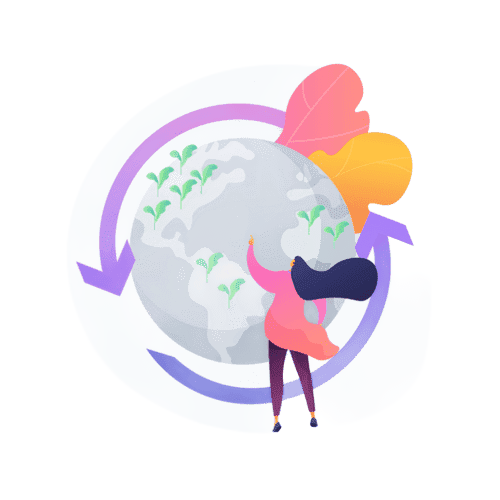The Future of Innovation: How Industry 4.0 is Driving Sustainable Development
Industry 4.0 is transforming manufacturing and business operations by integrating digital technologies to drive sustainable innovation. This article explores the role of Industry 4.0 in fostering eco-friendly practices, enhancing efficiency, and optimizing resource utilization. A structured roadmap outlines how businesses can leverage Industry 4.0 for long-term sustainability and competitive advantage.

The Era of Industry 4.0 and Sustainability
The world is at the forefront of a transformative industrial revolution—Industry 4.0. This digital-driven era is not just about automation and efficiency; it is reshaping industries by integrating sustainability into core business practices. Industry 4.0 is an enabler of sustainable innovation, bringing advanced technologies such as the Internet of Things (IoT), Artificial Intelligence (AI), big data analytics, and additive manufacturing to drive environmental and economic benefits. But how exactly does this revolution contribute to sustainable innovation? This article explores the roadmap to sustainable innovation and the pivotal role Industry 4.0 plays in achieving it.
Understanding Industry 4.0: A Paradigm Shift in Manufacturing
Industry 4.0 is characterized by the integration of digital technologies into manufacturing and business processes. It builds on the following foundational technologies:
- Artificial Intelligence & Machine Learning: Enhancing decision-making processes and optimizing energy consumption.
- Big Data & Analytics: Facilitating predictive maintenance and efficiency improvements.
- Internet of Things (IoT): Enabling real-time monitoring and control of operations.
- Blockchain: Ensuring transparency and traceability in supply chains.
- Additive Manufacturing (3D Printing): Reducing waste and enabling resource-efficient production.
- Cyber-Physical Systems (CPS): Connecting physical processes with digital capabilities for smarter manufacturing.
The Role of Industry 4.0 in Sustainable Innovation
A systematic review of Industry 4.0’s role in sustainable development identifies 11 core functions that facilitate sustainable innovation:
1. Advanced Manufacturing Competency (AMC)
- Enhances production efficiency while minimizing waste and energy use.
- Promotes lean and green manufacturing practices.
2. Green Absorptive Capacity Development (GACD)
- Encourages businesses to recognize and integrate environmental knowledge.
- Enhances capabilities to develop eco-friendly innovations.
3. Green Process Innovation Capacity (GPSIC)
- Focuses on modifying business processes to be more eco-friendly.
- Uses Industry 4.0 technologies to optimize energy consumption.
4. Green Product Innovation Capacity (GPTIC)
- Supports the development of sustainable products through digital simulations and additive manufacturing.
- Enables rapid prototyping of eco-friendly designs.
5. Interfunctional Collaboration and Learning (ICL)
- Breaks down silos in organizations to foster sustainability-focused teamwork.
- Enhances knowledge-sharing across departments and stakeholders.
6. New Product Development Competency (NPDC)
- Accelerates the innovation of green products by leveraging digital design tools.
- Enables companies to react swiftly to changing environmental demands.
7. Product Life-Cycle Management Capability (PLMC)
- Ensures sustainable practices across a product’s entire life cycle.
- Implements digital twin technology to track environmental impact.
8. Sustainable Innovation Orientation Development (SIOD)
- Aligns corporate strategy with sustainability goals.
- Encourages businesses to invest in green innovation.
9. Sustainable Partnership and Collaboration (SPC)
- Strengthens alliances with green technology providers and eco-conscious partners.
- Facilitates knowledge-sharing and co-development of sustainable solutions.
10. Sustainable Talent Management (STM)
- Promotes workforce training in sustainability best practices.
- Utilizes AI-driven HR solutions to recruit eco-conscious talent.
11. Value Chain Integration (VCI)
- Enhances transparency and efficiency in supply chains.
- Implements IoT and blockchain to track sustainability metrics.
%
Machine Downtime Reduction
By employing IoT, advanced sensors, and AI/ML for predictive maintenance, companies have reduced machine downtime by up to 50%. Source: Cognizant
%
Quality Enhancement
Implementing Industry 4.0 solutions has led to nearly a 20% improvement in product quality.
Source: Cognizant
The Roadmap to Sustainable Innovation Under Industry 4.0
The transition to sustainable innovation requires a structured approach. The roadmap involves the following stages:
1. Developing Interfunctional Collaboration & Learning
- Foster a culture of sustainability across all departments.
- Implement digital tools to streamline communication.
2. Integrating Value Chain Partners
- Engage suppliers and distributors in sustainability initiatives.
- Utilize real-time data for optimizing resource usage.
3. Building Advanced Manufacturing Competency
- Invest in smart factories and automated green manufacturing technologies.
- Leverage AI to monitor and reduce environmental footprints.
4. Enhancing Green Product and Process Innovation
- Deploy Industry 4.0 technologies for eco-friendly product development.
- Use blockchain for ethical sourcing and supply chain traceability.
5. Measuring & Scaling Sustainable Innovation
- Define key performance indicators (KPIs) for sustainability.
- Expand successful innovations across business units and industries.
Challenges & Future Directions
While Industry 4.0 presents vast opportunities for sustainability, it also introduces challenges:
- High Initial Costs: Implementing smart technologies requires significant investment.
- Data Security & Privacy Risks: Increased connectivity exposes businesses to cyber threats.
- Workforce Adaptation: Employees need to be reskilled to work with digital tools.
- Regulatory Compliance: Businesses must navigate complex sustainability regulations.
Future research should focus on the development of policies that incentivize green digital transformation, address ethical concerns surrounding automation, and explore the role of AI in optimizing circular economy models.
Conclusion
Industry 4.0 is more than an industrial revolution; it is a pathway toward a sustainable future. By leveraging digital transformation, businesses can enhance efficiency, reduce environmental impact, and create long-term value for all stakeholders. However, the success of this transition depends on strategic investments, collaboration, and policy support. As we move forward, embracing Industry 4.0 for sustainability is not just an option—it is an imperative for businesses and societies alike.
References
- Ghobakhloo, M., et al. (2021). Industry 4.0, Innovation, and Sustainable Development: A Systematic Review and a Roadmap to Sustainable Innovation.
- Digital Transformation and Innovation for a Sustainable Future, MDPI
- The Impact of Digital Transformation on the Sustainable Development of Manufacturing Firms, Journal of Economics and Development
- Digital Transformation as an Enabler of Sustainability Innovation and Performance, RESEARCHGATE
- Digital Transformation Drives Sustainable Innovation Capability, MDPI
- Digital Transformation, Smart Technologies, and Eco-Innovation, Sage Journals
Wanna know more? Let's dive in!
The Future of Process Audits: Trends and Developments
Process audits are evolving with trends like automation, AI, blockchain, and data analytics, enhancing accuracy and efficiency. Future audits will focus on continuous monitoring, risk-based approaches, and real-time insights. However, challenges in cybersecurity, data privacy, and auditor skill development will also shape the future of the field.
Common Findings in Process Audits: How to Address Them
Process audits commonly reveal issues such as inadequate documentation, inconsistent procedures, resource inefficiency, and poor communication. Addressing these findings requires robust corrective actions, risk management, and continuous improvement efforts. Implementing effective corrective and preventive actions (CAPA) ensures compliance, reduces recurring issues, and enhances overall process performance.
Preparing for a Process Audit: Tips and Best Practices
Preparing for a process audit involves structured planning, clear communication, and employee engagement. Key practices include maintaining audit readiness, conducting pre-audit assessments, using process mapping tools, and ensuring proper documentation control. Engaging process owners and fostering continuous improvement enhances audit success while addressing common challenges like resource constraints and stress.
Process Audits Explained: A Comprehensive Guide
Process audits are systematic evaluations of organizational processes to ensure compliance, efficiency, and effectiveness. They identify areas for improvement, mitigate risks, and ensure regulatory compliance. This guide explores types, methodologies, benefits, and challenges of process audits, providing a comprehensive understanding of their role in enhancing operational performance.
Step-by-Step Process for Passing Your First ISO Audit with Flying Colors
Preparing for your first ISO audit? This step-by-step guide breaks down everything from documentation and employee training to internal audits and corrective actions. Follow these essential steps to ensure you pass your ISO audit with flying colors and achieve certification success. Start your ISO journey today!
How Technology is Revolutionizing ISO Audits: Digital Tools for Compliance
Digital tools and audit management software are transforming ISO audits by improving accuracy, efficiency, and compliance. Automation, centralized data management, and AI-driven analytics streamline processes, reduce errors, and enhance risk management, making ISO audits more manageable and future-ready for organizations aiming to maintain certification.
What to Expect During an ISO Surveillance Audit: Staying Compliant Year-Round
ISO surveillance audits are essential for maintaining certification and ensuring compliance with international standards. This guide outlines what to expect during these audits, the importance of continuous improvement, and strategies for year-round ISO compliance, helping businesses pass audits effortlessly while enhancing operational efficiency and customer satisfaction.
Top 10 Benefits of Conducting Regular Internal Audits
Conducting regular internal audits before ISO certification offers numerous benefits, including early detection of nonconformities, streamlined audit processes, improved documentation, and cost savings. These audits foster continuous improvement, enhance risk management, boost organizational efficiency, and ensure long-term compliance, setting the foundation for successful ISO certification.
The Ultimate Guide to Preparing for an ISO Audit
Preparing for an ISO audit can be challenging, with common mistakes like poor documentation, insufficient internal audits, and lack of leadership involvement. This guide explores these pitfalls and offers expert tips, an audit readiness checklist, and strategies to ensure a smooth path to successful ISO certification.
Comprehensive Overview of Different Types of Audits
We explore various types of audits, including system, human error, clinical, cybersecurity, and business continuity audits. Each audit plays a unique role in ensuring compliance, improving efficiency, and reducing risks across different industries, helping organizations achieve their quality, safety, and operational goals.
Online Networking and Individual Development: A Deep Dive
Online networking enables global collaboration, transcending geographic limitations for personal and professional development. Through models like T-learning, I-learning, M-learning, and N-learning, individuals engage in knowledge sharing and growth. Effective e-moderation, scaffolded learning, and addressing challenges ensure productive and enriching online development experiences.
Networking and Innovation
Networking plays a crucial role in fostering innovation by enabling firms to share knowledge, access new markets, and pool resources. This article explores how diverse networks, including formal alliances and informal relationships, contribute to innovation while highlighting challenges such as network complexity and potential failures.












